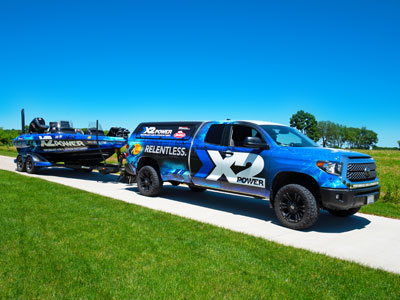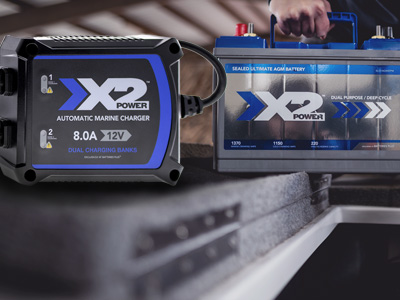Save Up To $100 on Select Marine Batteries - Buy Online & Pick Up In-Store - Limited Time - See Details
Marine & Boat
Battery Buying Guide
Marine & Boat
Battery Buying Guide
Why Consider Lithium Over Lead Acid Batteries?
10X
10 times longer life cycle
than a lead acid battery.
4X
Charges 4 times faster
than a lead acid battery.
2X
2 times more power
than a lead acid battery.
10 Year, 2000 Cycle Limited Warranty on X2Power Lithium Batteries With Bluetooth
Low Self-Discharge | Flexible Installation | Consistent Power | Lightweight | Maintenance Free | Super Safe
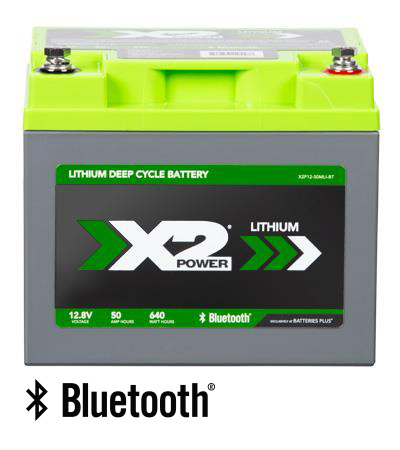
X2Power Deep Cycle Lithium Batteries are Bluetooth Enabled
Recommended Batteries for Common Applications
| Application | Deep Cycle or Lithium | Dual Purpose | Starting |
|---|---|---|---|
| Trolling Motor | Deep Cycle AGM or Lithium Recommended for Trolling Motor | Dual Purpose Recommended for Trolling Motor | Starting Not Recommended for Trolling Motor |
| Live Well Pump | Deep Cycle AGM or Lithium Recommended for Live Well Pump | Dual Purpose Recommended for Live Well Pump | Starting Not Recommended for Live Well Pump |
| Fish Finder | Deep Cycle AGM or Lithium Recommended for Fish Finder | Dual Purpose Recommended for Fish Finder | Starting Not Recommended for Fish Finder |
| Inboard/ Outboard Motor |
Deep Cycle AGM or Lithium Not Recommended for Inboard/Outboard Motor | Dual Purpose Recommended for Inboard/Outboard Motor | Starting Recommended for Inboard/Outboard Motor |
| Marine Lights | Deep Cycle AGM or Lithium Not Recommended for Marine Lights | Dual Purpose Recommended for Marine Lights | Starting Recommended for Marine Lights |
| Communication Radio | Deep Cycle AGM or Lithium Not Recommended for Communication Radio | Dual Purpose Recommended for Communication Radio | Starting Recommended for Communication Radio |
Learn About the Different Types of Marine Batteries

Did you know...
Deep cycle batteries come in both AGM and lithium chemistries.
Deep cycle marine batteries feature a heavy charge and discharge cycle, making them perfect for long-lasting power on fishing boats, kayaks, and any other watercraft using a trolling motor or electric motor.
If you're operating a live well pump, depth finder or fish locator, a deep cycle marine battery generates the reliable, durable energy you need.
Deep cycle, or deep cell batteries are designed with fewer, but thicker plates, which means they can be discharged at a consistent rate for a longer time, at a higher depth of discharge.
It also means they can withstand high temperatures while providing high electrical currents. Deep cycle boat batteries can be drained and recharged many times; starting batteries can't. That's why they're typically used to power electric motors, and other applications, too.
Compare the Top 4 Marine Battery Brands
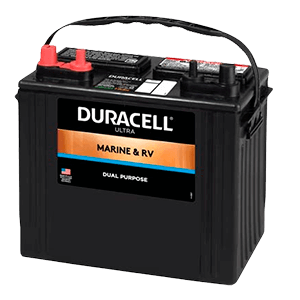
Duracell Ultra Flooded
- 12 month warranty
- Free replacement warranty
- Conventional technology
- Rugged design; vibration resistant
- Extended power & battery life
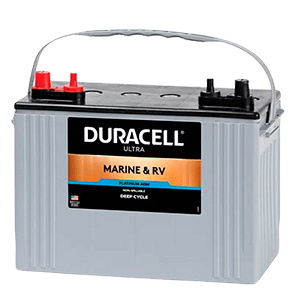
Duracell Ultra Platinum AGM
- 30 month warranty
- Free replacement warranty
- AGM technology
- 20x more vibration resistant than conventional batteries
- High reserve capacity to power accessories
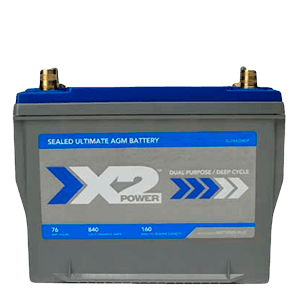
X2Power AGM
- 48 month warranty
- Free replacement warranty
- AGM technology
- 28x more vibration resistant than conventional batteries
- Performs as both a starting and a deep cycle battery
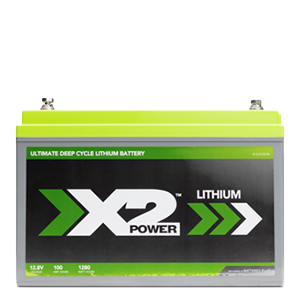
X2Power Lithium
- 60-120 month warranty
- Free replacement warranty
- Lithium chemistry
- Lasts 10x longer than traditional lead batteries
- Only to be used for deep cycle applications
Marine Battery Care & Maintenance
It won't work if it's not cared for properly, especially in the off-season.
5 Simple Steps to Prolong the Life of Your Marine Battery
- Keep track of your battery status. Monitor its state of charge/discharge and never let the charge fall below 50%. Letting batteries fall lower than a 50% charge regularly will dramatically reduce the life of your battery. If you have an X2Power Lithium Bluetooth boat battery, you can monitor it on your phone.
- Choose an adequate battery size for your needs. Using a battery that is too small will force the battery to use more power than necessary and reduce the usable life of the battery.
- Minimize your power demands. Arguably the most inexpensive way to increase life expectancy of your battery is to turn off unnecessary electronics when not in use, like fish finders, lights (when not necessary), etc.
- Add an alternative energy source like solar panels or a wind turbine to help keep the batteries charged to optimal levels.
- Equip a smart charging regulator to create the ideal charging environment to charge the battery with the boar’s alternator.
Tips For Maintaining Your Boat Battery
- Get your current battery tested - Have your battery tested for free at Batteries Plus, especially if you've had your boat in storage for a season or more.
- Get yourself a battery box - Use a battery box to minimize the impact of vibration and also to keep your battery secure. (Note that sometimes they're required by law.) An unsecured battery can cause damage to both the battery and your boat.
- Keep connection points clean and electrolyte levels up - If you notice corrosion on your battery terminals, clean it up with a mixture of baking soda and water. If your boat carries a flooded battery, monitor the electrolyte levels before charging or operating your boat.
- Waterproof chargers for the win - Waterproof chargers are perfect for your time on lakes, rivers or other waterways; you'll never find yourself on the water with a dead battery.
Note: Choose a charger with a high enough amperage for your battery. The Duracell Ultra Automatic and Ultra Marine chargers are good options.
Frequently Asked Questions
The answer to this question largely depends on the type of charger that you have. Many newer chargers are "smart" meaning they will constantly analyze the battery state as it's charging and automatically change the charging mode to match the needs of the battery. These chargers will shut off when a charge is not needed and is completely safe to leave connected.
If you have a charger that is not automatic you will want to plug in the charger and leave it plugged in until the battery is charged. As soon as the battery is fully charged you will want to disconnect the battery from the charger to prevent unnecessary damage to the battery.
Generally speaking, your batteries should be "fully charged" at all times if possible. The worst thing that you could do is come home after a long boating day and let your used batteries sit. Ideally, you will want to fully charge your batteries at least once a month to ensure a long life. Using an automatic charger is a foolproof way to ensure batteries stay charged and ready. Plug in the charger after every trip and let it do all of the work.
Dual Purpose batteries can be used for both deep-cycle and Starting applications. A deep-cycle battery should only be used for deep-cycle applications like powering trolling motors and other accessories, a dual-purpose battery can be used to power accessories and start your boat without the need for multiple batteries. Depending on your boat's power demands, you may need separate batteries, one for starting and one or more for accessories and equipment.
No. A deep-cycle battery should never be used as a starting battery. Using a deep-cycle battery to start your boat engine could damage the battery and shorten its usable life.
The size of the battery will largely depend on the application, either starting, deep-cycle or both, and how much power you need to run everything and/or start your boat. Smaller boats with few power demands may be able to start and run accessories with one dual-purpose battery, while larger boats with a lot of power demands like trolling motors, fish finders and depth finders may need several batteries. A cranking battery to start the boat and at least one deep-cycle battery to power the rest.
A good rule of thumb for starting batteries is to have at least 1 cranking amp per cubic inch for gasoline engines and 2 cranking amps per cubic inch for diesel engines.
Power to Your Life on the Water



